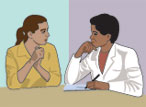|
Your Feelings During Chemotherapy
|
|
At some point during chemotherapy, you may feel:
- Anxious
- Depressed
- Afraid
- Angry
- Frustrated
- Helpless
- Lonely
It is normal to have a wide range of feelings while going
through chemotherapy. After all, living with cancer and getting
treatment can be stressful. You may also feel fatigue, which can
make it harder to cope with your feelings.
|
|
How can I
cope with my
feelings during
chemotherapy?



|
-
Relax. Find some quiet time and think of yourself in a
favorite place. Breathe slowly or listen to soothing music.
This may help you feel calmer and less stressed.
- Exercise. Many people find that light exercise helps them
feel better. There are many ways for you to exercise, such as
walking, riding a bike, and doing yoga. Talk with your
doctor or nurse about ways you can exercise.
- Talk with others. Talk about your feelings with someone
you trust. Choose someone who can focus on you, such as
a close friend, family member, chaplain, nurse, or social
worker. You may also find it helpful to talk with someone
else who is getting chemotherapy.
- Join a support group. Cancer support groups provide
support for people with cancer. These groups allow you to
meet others with the same problems. You will have a
chance to talk about your feelings and listen to other
people talk about theirs. You can find out how others cope
with cancer, chemotherapy, and side effects. Your doctor,
nurse, or social worker may know about support groups near
where you live. Some support groups also meet online (over
the Internet), which can be helpful if you cannot travel.
Talk to your doctor or nurse about things that worry or upset
you. You may want to ask about seeing a counselor. Your doctor
may also suggest that you take medication if you find it very
hard to cope with your feelings.
|
| It is normal to have a wide range of feelings
while going through chemotherapy.
After all, living with cancer and getting
treatment can be stressful.
|
|
| Ways to Learn More |
To learn more about coping with your feelings and relationships
during cancer treatment, read Taking Time: Support for People
With Cancer, a book from the National Cancer Institute.
You can get a free copy at www.cancer.gov/publications or
1-800-4-CANCER.
| National Cancer Institute |
 |
Cancer Information Service
|
CancerCare, Inc.
Offers free support, information, financial assistance, and
practical help to people with cancer and their loved ones.
|
|
Toll-free:
|
1-800-813-HOPE (1-800-813-4673)
|
|
E-mail:
|
info@cancercare.org
|
|
Online:
|
www.cancercare.org
|
|
Back to Top
< Previous Section | Next Section > |